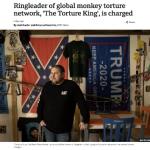Originally posted May 5, 2004.
Left Behind, pp. 45-46
Untold millions are still untold
Untold millions are outside the fold
Who will tell them of Jesus’ love
And the heav’nly mansions awaiting above?
So our man Rayford Steele has finished his “emergency duty,” which consisted of walking to the terminal of O’Hare airport instead of accepting a ride. Confronted with the chaos and carnage of multiple plane crashes, a lesser man — a Bernie Laplante — might have panicked and done something foolish, but not Steele. He surveyed the scene and his professional training kicked in. His duty was clear: he walked the other way.
Now, safely back at the terminal, “Rayford wanted more than anything to sit and talk with someone about what to make of this.”
Apparently, Hattie doesn’t count. The two of them just walked more than two miles together. Despite their long acquaintance — “They had spent time together, chatting for hours over drinks or dinner” — she’s still just a pretty girl and not really “someone” worth talking to.
In the terminal, “Everyone scurried about, trying to find some link to the outside world, to contact their families, and to get out of the airport.”

The cell-phoneless Rayford and Hattie join in the scurrying, splitting up to try to call their families.
Here again we see the storytelling mastery of Jerry Jenkins. He knows that what readers are longing for now is another passage on the logistics of telecommunications. And he delivers.
Steele makes his way to a pilot’s lounge where a “supervisor” alerts them that some special phone lines have been reserved, just for pilots. Steele gets in line with the privileged few.
Here LaHaye and Jenkins had me worried. Steele seemed to be in real peril. According to the Scream morality governing the world of Left Behind, accepting special privileges because of your status as a pilot is a grievous sin.
Hadn’t Steele just chewed out his copilot Smith for just such behavior? Smith accepted a ride back to the terminal, but Steele had refused — even despite the airline’s insistence. Yet now, with an airport full of people desperate to make phone calls, Steele happily jumps at the chance to use a special phone line and to “bypass the normal trunk lines out of here, so you won’t be competing with all of the pay phones in the terminal.”
But then I realized the difference between Smith’s actions and Steele’s. Smith accepted a ride in public. (“How would that look?” Steele had said.) But no one would know that Steele was bypassing the other callers on a privileged, pilots-only line. In the world of LB, it’s okay to use your privilege to get ahead as long as no one sees you do it.
Rayford got in line, beginning to feel the tension of having flown too long and known too little. Worse was the knowledge that he had a better idea than most of what had happened. If he was right, if it were true, he would not be getting an answer when he dialed home.
Here I caught a first whiff of what it is that really separates the Left Behind novels from most of the evangelical genre fiction that had gone before.
Evangelical Christianity, at its core, is radically inclusive. Evangelicals, born-againers, want everybody else to become born-again too.
Granted, this inclusivity isn’t always expressed in the most winsome or persuasive manner, but it’s the heart and soul of evangelicalism. As the Sunday school chorus quoted at the top of this post shows, the goal of evangelicals has traditionally been to reach out to the lost, to the “untold millions” of the unsaved.
Most evangelical fiction has conveyed this evangelistic impulse — albeit with the unfortunate awkwardness and fecklessness that characterizes too much of their evangelism. But that’s not what one finds in Left Behind. Here you find little concern — and even less of a sense of responsibility — for the plight of the untold millions. What one finds instead is a sense of triumphalism. Those “inside the fold” feel no sense of obligation to those on the outside — they are bad people who are getting what they deserve and the godly remnant gets to watch, more in delight than in sadness. This is a major theme of the book and one we’ll be exploring in more detail in the chapters to come.
Rayford realizes that he “had a better idea than most of what had happened,” yet he feels little obligation to share this news. At this point in the story Rayford is not yet a Christian himself, but his outlook doesn’t change greatly even after he becomes one. In Left Behind the gospel is not the good news of salvation to be shared with the untold millions. It is a secret to be treasured, hoarded and hidden under a bushel by the chosen few.
And what about those untold millions? They can go to Hell.
















